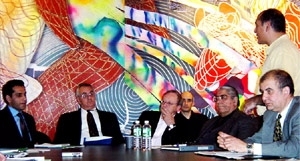Congressman Barney Frank, D-Mass., offered the Society of Afghan Engineers moral support and fund raising suggestions at an MIT conference on rebuilding Afghanistan on Feb. 8.
"I think we had the right to go after Osama Bin Laden. But we caused great pain and destruction in Afghanistan. And having done what we did in Afghanistan for good reason, we have reason to undo it. We have a moral obligation. This time, we are not going to abandon Afghanistan again," Frank said to the professional group of 40 Afghan expatriates, including two alumni of the School of Architecture and Planning--Najim M. Azadzoi (S.M. 1984) and M. Rafi Samizay (M.A.A. 1974).
The day-long event was hosted by MIT's Special Interest Group in Urban Settlement (SIGUS), directed by Reinhard K. Goethert, research associate in architecture.
"The workshop explored reconstruction from the eyes of Afghan professionals trained in the US. The focus was on eventual establishment of an advisory interface between the new government of Afghanistan and the development agencies. The key questions were how could the Society for Afghan Engineers support Afghanistan? What would be suitable mechanisms?" Goethert said.
The Society for Afghan Engineers (SAE) is a 250-person group of native Afghans, many of whom attained advanced degrees in the United States after graduating from the University of Kabul. Civil and electrical engineers, architects and urban planners, they practice in the United States as naturalized citizens.
The SAE is well-positioned to help realize goals for rebuilding Afghanistan, Goethert noted.
"The SAE provides a unique perspective. The professionals have roots in both worlds: brought up and trained originally in Afghanistan, with further advanced studies in the US and considerable years of professional experience. They speak the language, understand both cultures, have extensive professional skills and experience, and are uniquely positioned to provide links among the government and development agency interests," he said.
Next steps for the SAE group include setting up an exploratory mission in Afghanistan, establishing a field office in Kabul and preparing a specific proposal to submit to development agencies, Goethert said.
Frank encouraged the group but sidestepped the SAE's request for $500,000 to establish offices in Kabul and Washington. The group's role in reconstruction could range from designing roads and pipes to coordinating development agencies.
Frank said the mood in Washington is to await initiatives from Afghanistan's government. He directed SAE members to solicit funds from US foundations.
Haron Amin, the charge d'affaires of Afghanistan's Washington embassy who attended the workshop, is scheduling a fact-finding flight to Kabul for US professionals in March, Goethert noted.
MIT has had a long-standing commitment to the field of international development through the School of Architecture and Planning with its Department of Urban Studies and Planning (DUSP) and the SIGUS Group, Goethert said.
DUSP offers support to development agencies and governments, in terms of direct assistance, research and training. Its four program areas of information systems, environmental policy, city design and housing provide a broad range of expertise for any development effort.
Initiated in 1964 through a Ford Foundation grant, the SIGUS group researches community scale development. Its recent work has focused on improvement of urban slums, which would be directly applicable to the situation in Kabul, Goethert said.
A version of this article appeared in MIT Tech Talk on February 27, 2002.






